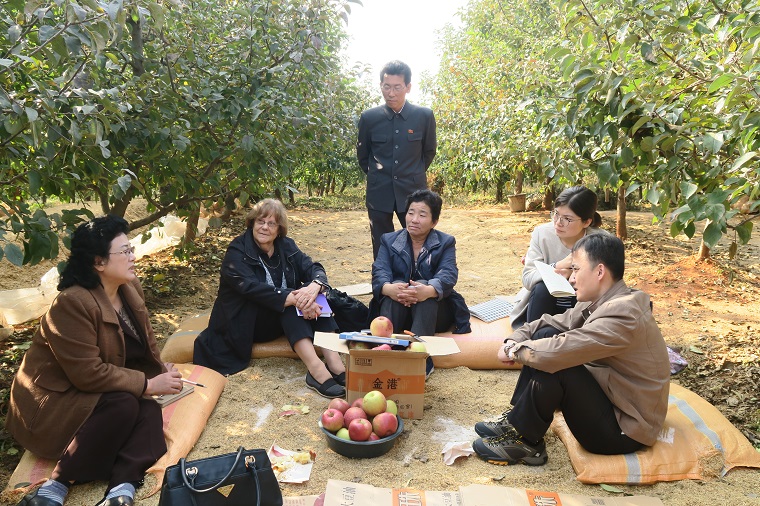
By Daniel Jasper
The Democratic People's Republic of Korea (DPRK/North Korea) has been in the news a lot lately after President Trump announced a historic second summit with Chairman Kim Jong Un in late February. The decision came less than year after the first summit, and the world is watching with a mixture of hope, fear, and skepticism — depending on who you ask.
The news coverage and analysis may leave many people wondering, “Is peace between the U.S. and DPRK even possible?”
The answer is absolutely yes. And the way forward can be seen through the lens of AFSC’s experience—from the beginnings of our involvement in 1953, when we worked with refugees and families divided by the war, to our current program, which helps North Korean farmers raise farm productivity and improve food security.
Educating policymakers in Washington, D.C. about possibilities for cooperation with DPRK is part of my work with AFSC. Here are just a few of the points we have been making in our meetings with the National Security Council, the State Department, and Congress about ways to pursue peace.
Humanitarian issues are a good starting place for dialogue.
If you are looking for a politically low-risk way to relieve tensions, humanitarian engagement is your best bet. Why? The stakes are lower. Common ground is easier to find. Success is more likely. Plus, these kinds of projects present opportunities for building mutually beneficial relationships—and trust.
AFSC has the longest-running program in DPRK of any U.S. nongovernmental organization. Our program began in 1980 and has helped maintain what little stability there is in the U.S.-DPRK relationship. That’s why it is vitally important for Congress and the administration to ensure humanitarian access by organizations like AFSC.
Family reunions bring countries closer.

Korean and Korean-American families offer an important opportunity for the U.S. and DPRK to collaborate on an achievable project. Following the Korean War, families became separated by the demilitarized zone separating the two Koreas. More than 100,000 members of those divided families came to the U.S., thousands of whom are still alive and remain eager to reunite with their loved ones after almost 70 years of separation.
At one time, these families could travel to the DPRK on their own if they could locate their family members, but today, they require government permission and assistance to reunite. While the South and the North have carried out 20 rounds of family reunifications over the past 18 years, Korean-Americans haven't been able to participate. We have seen these reunions serve to de-escalate tensions—and we urge the U.S. to consider initiating a family reunion, both to do right by separated Korean-American families and as a means of building better relations.
Reuniting these families presents an opportunity to build cooperation and help heal the open wound of the unfinished Korean War, which never officially ended.
Take action today: Tell President Trump to reunite Korean and Korean-American families.
Repatriating remains could help build bridges.
In 2016, AFSC worked with former Gov. Bill Richardson (who also served as Secretary of Energy and U.N. ambassador) and with families of U.S. servicemembers to sponsor a delegation to DPRK. Their mission? To discuss bringing home servicemembers’ remains—something that would mean a great deal to the families of those who died in the Korean War and present a practical opening to de-escalate tensions between the U.S. and North Korean militaries. In the years that followed, AFSC continued to advocate for the repatriation of service member remains.
The work paid off! Last summer, President Trump and Chairman Kim agreed to repatriate the remains of 55 U.S. servicemembers. The operations are set to continue and, hopefully, expand this spring. Officials close to the issue have stated that it is the most successful cooperation currently happening between the U.S. and DPRK. We’d like to see that cooperation continue and, in a similar vein, to see President Trump and Chairman Kim agree to reuniting families as they have agreed to the repatriation of remains.
Reasons for optimism
Recently, the United States overturned policies that restricted humanitarian access and aid to DPRK, and we are encouraged that humanitarian work may continue as normal this spring. Recent comments made by Stephen Biegun, special representative for North Korea Policy, suggest that the U.S. is prepared to end the 70-year-old Korean War. This is big news, and we see room to expand peacebuilding efforts between the U.S. and DPRK.
Want to get involved?
Visit our Engaging North Korea webpage to:
- Urge your elected officials to work for peace.
- Get tips on how to talk about the DPRK.
- Find resources, reports, and videos on AFSC’s work in the DPRK.